It was snowing as we arrived.
"Thats strange," noted the woman sitting by us on the plane.
I have seen many things in NOLA, rain from the sky, ashes of my father, pouring into the Mississippi, music floating through the air.
But the snow felt otherworldly.
I remember what Scout said when she first saw the unfamiliar image in To Kill a Mockingbird.
"The world's end'in"
Atticus laughed. We laughed, a giddy feeling.
We were back in NOLA. It had been three years since I'd gone there to say goodbye to Dad.
We traveled to NOLA to take in the writers conference in Pirates Alley, off Jackson Square, where Faulkner wrote Soldier's Pay in the 1920's.
Its not quite clear, at least for me, how to navigate Faulkner's kaleidoscopic landscape of memories, folklore and a make believe geology that seems more real than our magic reality. Most of my literary heroes, Marquez, Vargas Llosa, Borges, found their voices ripping off his sensibility, transporting reflections on his made up Yoknapatawpha County, into a Macondo all the world would find a place for themselves in.
On the way, one sentence that seemed to stick with me from Absalom, Absalom:
"...our father knew who his father was in Tennessee and who his grandfather had been in Virginia and our neighbors and the people we lived among knew that we knew and we knew they knew we knew and we knew that they would have believed us about whom and where we came from even if we had lied, as as anyone could have looked at him one and known that he would be lying about who and where and why he came from by the very fat that apparently he had to refuse to say at all..."
We were not refusing to say anything. It was weird to be in NOLA without my dad, who always told stories about where we came from, embellishing a bit here, elaborating a bit there, rarely letting the truth get between him and a good story. Growing up in Dallas and visiting grandparents in Thomasville GA, NOLA was always the best place to stop in between, getting lost, eating beignets, listening to steel drums, visiting the voodoo museum, that was my NOLA. Over the years, we saw Pete Fountain play together, had jazz brunch at Commander's Palace, dropping by after a visit to Mississippi or Florida, meeting there every for years until he finally shuffled off and we spread his ashes in the Mississippi and around the French Quarter.
Only memories of Dad were with us this time, those and the lingering wreckage of the storm that hit two days after we visited in August of 2005. These days, dodging storms seems like all we do.
But we'd make due. We were staying in a neighborhood in Marigny:
I always love staying in this neighborhood. My friend Josh sent me a list of tips for people and places to enjoy here.
"Have you lived here before?" people ask him.
"In the future," Josh replies.
He suggested we get a drink a Big Daddy's before we headed out for dinner.
Caroline suggested we get a snack before dinner. So i got her peanuts and beer, chatting with the guys at the nearby bodega.
At Big Daddy's, she drank whisky. I had a Pabst. And we chatted about how fun it is to fall in love with cities and each other over and over and over again together.
It was close to dinnertime, so we made our way to Royal, past the lanterns, gorgeous, haunting winter lights outside the quarter on our way to Galatoires, my all time favorite restaurant in the world.
Zagat writes:
Grandad wired money there during the war so Grandmom and Dad and Uncle Kirk could celebrate their anniversary during the war in 1943. We always went there, when I was a kid, two days before Katrina in 2005 and later in 2010 in our last trip there together. His ashes are spread right outside. I love the place and so does Caroline, in a love and hate kind of way.
She ordered a martini. I had a gin and tonic.
They delivered them immediately.
I'm starting to see what you mean about this place, noted Caroline.
The sweetbreads and gumbo and turtle soup were delicious.
My gumbo was divine.
More wine and lamb and Crabmeat Maison, full of lumpy Louisiana crabmeat.
So, we hungout and chatted, told stories about bygone love, ate, told more stories, and
chatted with our amiable waitress.
They were out of pompano.
It was sold out at lunchtime today, she explained.
I didn't know it was so busy.
Have you been to Galatoire's at lunch? she asked, showing us a video of the crazy festive restaurant.
We talked about Kermit Ruffins' show later that night, looking at the WWOZ calendar, listing all the gigs that evening.
I went to the bathroom.
When I came back the room was whirling around Caroline who was looking green.
"Ben....?" she asked.
To avert a disaster, we grabbed the bill and ran for fresh air, making our way through the night, past the holiday lights and gas lamps along Royal Street, past Big Daddy's back to Marigny, where everything makes more sense.
A cat was sitting on the stoop when we emerged into the day. We made it out to the Flora Caffee on Royal Street, full of cats and crafts, books and breakfast. I fall in love with NOLA a thousand times each trip. This trip no different than any other. They were playing WWOZ. Music would be teaming from the streets of the city all day long.
Caroline wandered and I made my way to Hotel Monteleone for the Faulkner conference, talking with agents, brainstorming all day long.
How was the conference, asked Caroline sitting in Jackson Square, musicians playing, the sun shining in her face.
They think its the going to change literature forever, I fibbed.
Is that true?
I demurred.
In my mind it already has.
The town is full of these fables, growing out the lore of the treacherous history of slavery, wars, invasions, ships making their way to and from the Caribbean, up the Mississippi, governments coming and going, past the Cabildo, the site of the Spanish Colonial Government in New Orleans, adjacent from St Louis Cathedral. My friend Rob Magnuson Smith, wrote perhaps my favorite story about NOLA, imagining a night there. He begins with a confession that might as well have been a boast.
We always do. Rob's words brought me here to explore my story and its oddball connections with this place of my past and present.
Caroline and I made our way to the World War Two Museum to research more of the brutal history of our collective experiment in democracy.
The pain of the experience, the apocalyptic Pacific Front, the futile frozen, haunting forests of Germany, the gas chambers, the prisoners of war, these were the grist of the war and its memories. We explored them all afternoon.
The agents had wanted me to frame my story as something about surviving a war, the aids plague.
"One cannot go to war and come back normal," confessed Richard Proulx, an infantryman of the US Army.
This seemed to resonate.
When it was all too much, we ventured out for some andouille sausage and duck gumbo and beer, chatting away.
Best gumbo I ever had, Caroline told the waitress.
They talked about the roux.
First you start with a roux.
There's so much to see.
She wanted to go to the garden district. On the way, we walked past the Lee Monument, former sight of a sculpture by Alexander Doyle. Caroline and I looked up. Nothing was there. Digging for our phones, where we found, that "it was removed intact by official order from that location on May 19, 2017 to one unknown and any future display is uncertain."
Memories are harder to remove.
There is so much of it here. We just scratch the surface. But still we ride the trams and look at the trees, where vines and Spanish moss hangs. Strange fruit used to hang there, Billy Holiday reminded us, now just memories. But to this day, Louisiana has the highest prison per capita in the world, imprisoning more of its people, per head, than anywhere.
The Lafayette Cemetery on Washington Street, where some thousand families and another 7,000 people are buried, was closed. Feelings furious and longing, I climbed over the fence to explore the place, taking in the creaky, ominous and majestic, even sexy, eros and thanatos.
A sign outside the cemetery warns. "No solicitation in the cemetery."
They know.
On our way to dinner, we talked with some women in an occult shop about the tarot cards and her snakes.
"You cannot get a bad card. You might not be ready for what it says."
I guess none of us are really ready for the cards we are dealt.
The Faulker Gala was that night. So we walked back down Royal Street to Hotel Monteleone.
But I wasn't up for it. I was feeling like the character in Rob wrote about in the Cabildo.
Lets get out of here, Caroline smiled.
Thank you.
All the energy of the weekend pointed us back to the Marigny, where the Marina Orchestra was going on stage at 930. "A EUPHORIC BRAND OF ROCK N' ROLL STEEPED IN LATIN AMERICAN, CARIBBEAN AND AFRICAN MUSICAL STYLES," their quircky life affirming beats were just what we needed to pull us out of the dark mood enveloping us.
The show was at Buffa's, a distinct spot for food in the Marigny.
"Where are the bands playing?" I asked a man standing outside.
"Just over here."
He pointed to the back door.
"Do they have food there?"
"Some of the best in the world. Get the Buffo Balls."
And thats exactly what we did, listening to the sweet tunes drinking NOLA Blonde Ale. At first they laughed that no one was there. But the room filled up. The cook walked up to make sure the food was right. It certainly was. More beer and music.
The music, red beans and rice fortified us, Caroline and i talked about the story and a memory from San Francisco.
Thats your story she told me, smiling.
She's the talent.
We all channel the feeling here.
"If a story is in you, it has to get out," advised Faukner.
Such a feeling being here thinking about there, countless stories growing out of the Crescent City and its many graves.
It was a little scary to leave.
But we were not the first feel that way.
"Leaving New Orleans also frightened me considerably. Outside of the city limits the heart of darkness, the true wasteland begins," writes John Kennedy Toole. We are always entering and leaving it, just like those drives from the farm in Bridgeboro and Dallas, coming and going, dropping in for the night, looking at the graves above the ground, the Spanish moss in the trees in the distance, the road house food. The road goes on forever. I can still feel the breeze in my face.
 |
| A return to a lovely snowy brooklyn and its majestic skies. |





















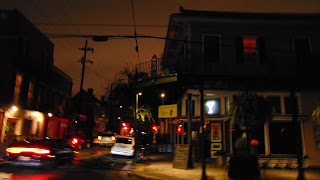























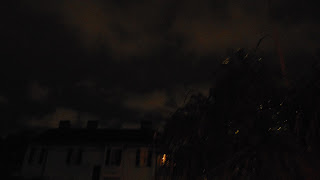











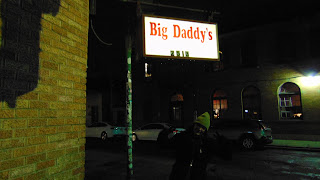





































































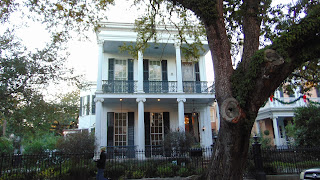























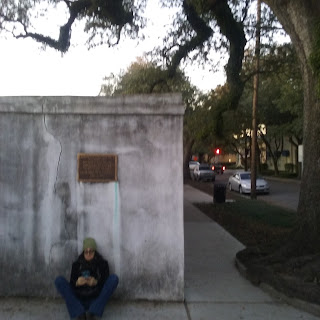





















No comments:
Post a Comment